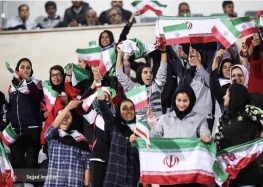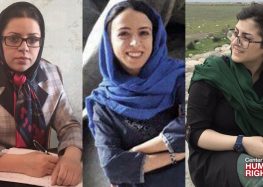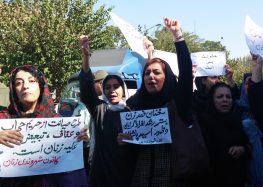In Brazen Electoral Interference, Hardliners Disqualify Female Reformist MP

Reformists Call on Rouhani to Stop Hardliners from Blocking Elected Candidates
March 24, 2016—The reformist MP Minoo Khaleghi, newly elected to Parliament from the city of Isfahan and one of 14 women who ran successfully in Iran’s recent elections, has been disqualified by the Guardian Council.
No reason has been given for Khaleghi’s disqualification, and the disqualification of a candidate after being vetted, allowed to run, and elected is extremely rare, although not unprecedented in Iran.
“What hardliners couldn’t achieve through the ballot box, they’re trying to achieve through post-election maneuvering,” said Hadi Ghaemi, executive director of the International Campaign for Human Rights in Iran.
“The Guardian Council abused their power to vet candidates by disqualifying the vast majority of reformist candidates. And when reformists still scored impressive gains, they abuse it again by negating those gains after-the-fact,” Ghaemi added.
Reformists have called on President Hassan Rouhani to prevent this move by hardliners to block their candidates from serving even after they are elected.
Khaleghi, a 30-year-old doctoral student in general law, ran as a reformist candidate and received the third highest number of votes in Isfahan, which is located 211 miles south of Tehran.
The governor general of Isfahan Province and reformist websites reported that Khaleghi was disqualified by the Guardian Council, the body charged with vetting candidates to Parliament—but Khaleghi said she had not received official confirmation.
“I stood as a candidate approved by the honorable Council of Guardians and was elected by the dignified people of Isfahan with 193,399 votes,” she said in a statement published on March 23, 2016.
“So far I have not received any reports about campaign violations or anything else that might disqualify me,” she said. “Also, I have not had any meetings with the honorable members of the Council of Guardians since the election campaign began.”
Isfahan’s Governor General Rasoul Zargarpour told the press that the Interior Ministry had informed him of the Guardian Council’s approval of only four of the five candidates elected in Isfahan.
“The election of the third candidate (Minoo Khaleghi) was nullified,” he said, according to an article published in the semi-official Mehr News Agency on March 23, 2016. He did not say why the Guardian Council had disqualified Khaleghi.
“We are following up on this matter,” he said, adding: “Given past experience, if the Council of Guardians insists on her disqualification, then the candidate with the next highest number of votes would replace her.”
The Interior Ministry and the Guardian Council have not issued official statements on Khaleghi’s status due to the Persian New Year holidays (starting on March 20).
The only comment made on behalf of the Guardian Council has come from its Election Monitoring Central Headquarters. Its spokesman, Siamak Rahpeyk, told the hardline Fars News Agency on March 22, 2016 that four of the five elected candidates had been approved and the fifth person would be elected during mid-term parliamentary elections in 2017.
This contradicts Isfahan’s Governor General Rasoul Zargarpour’s statement that the replacement candidate would be the one with the next highest votes, and indicates that Khaleghi’s disqualification had little to do with her and everything to do with blocking reformist MPs, given that the sixth candidate on the list who would take Khaleghi’s place was also a moderate-reformist candidate, Alireza Ajodani, with 175,938 votes.
“The Islamic Republic needs to decide whether it’s going to be a country ruled by law or by the whim of disgruntled officials. The Guardian Council vetted the candidates, and the people have voted. No one should be allowed to flout the results,” said Ghaemi.
The Reformist Front Coordination Council in Isfahan, an informal group that gathers and rallies during election time, has called on President Hassan Rouhani to prevent attempts by hardliners to block elected candidates from entering Parliament.
“The strange action by the Council of Guardians in disqualifying Ms. Minoo Khaleghi, the third candidate elected by the people of Isfahan, has caused widespread concern in this city,” it said in a statement published by the Iranian Labor News Agency (ILNA) on March 23, 2016.
“Such actions will create the impression of partisan purges, which no doubt will give the Islamic Republic a bad reputation it certainly does not deserve,” said the statement.
Some reports suggested that the Guardian Council nullified her election when it received a claim that Khalehghi had shaken hands with a man while on a trip to China. She has denied the allegation.
Touching a member of the opposite sex who is not a relative is illegal in Iran.“There has been every kind of rumor and immoral talk surrounding me,” said Khaleghi in her statement. “These actions are all aimed at questioning my reputation as a Muslim and as such are punishable according to Sharia law.”
“Therefore the police and judicial officials must take swift action to deal with the individuals [defaming me],” she added.
After the February 26 elections, the Interior Ministry reported Isfahan’s voting results in the following order: Hamidreza Fouladgar 200,690 votes; Nahid Tajeddin 195,066 votes; Minoo Khaleghi 193,399 votes; Heydarali Abedi 179,230 votes; and Ahmad Salek 176,807 votes.
The combined votes of Tajeddin, Khaleghi and Abdi resulted in the reformist camp winning a majority of seats in Isfahan. Two of the five winners in Iran’s third largest city were women.
More than 6,000 candidates who were approved by the Guardian Council ran in the elections for Iran’s 290-seat Parliament. Twice as many had registered but were disqualified. In addition to the massive disqualifications, which disproportionately removed reformist and moderate candidates, there were reports of serious voting irregularities in several cities.






